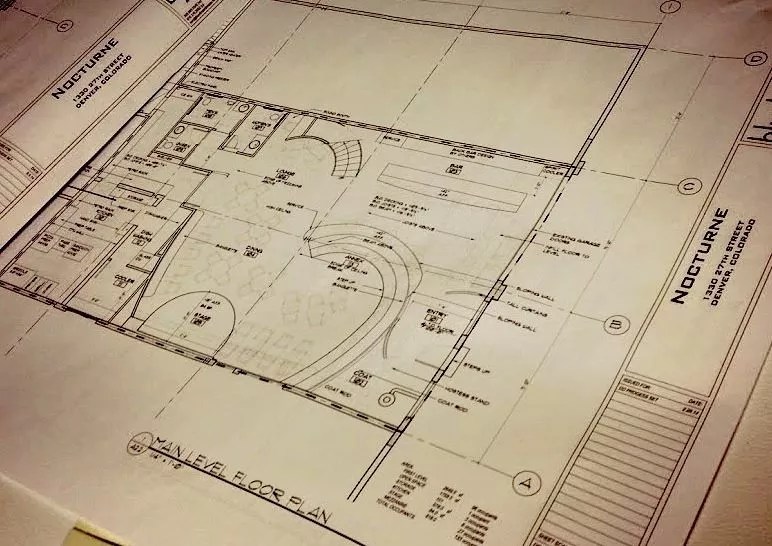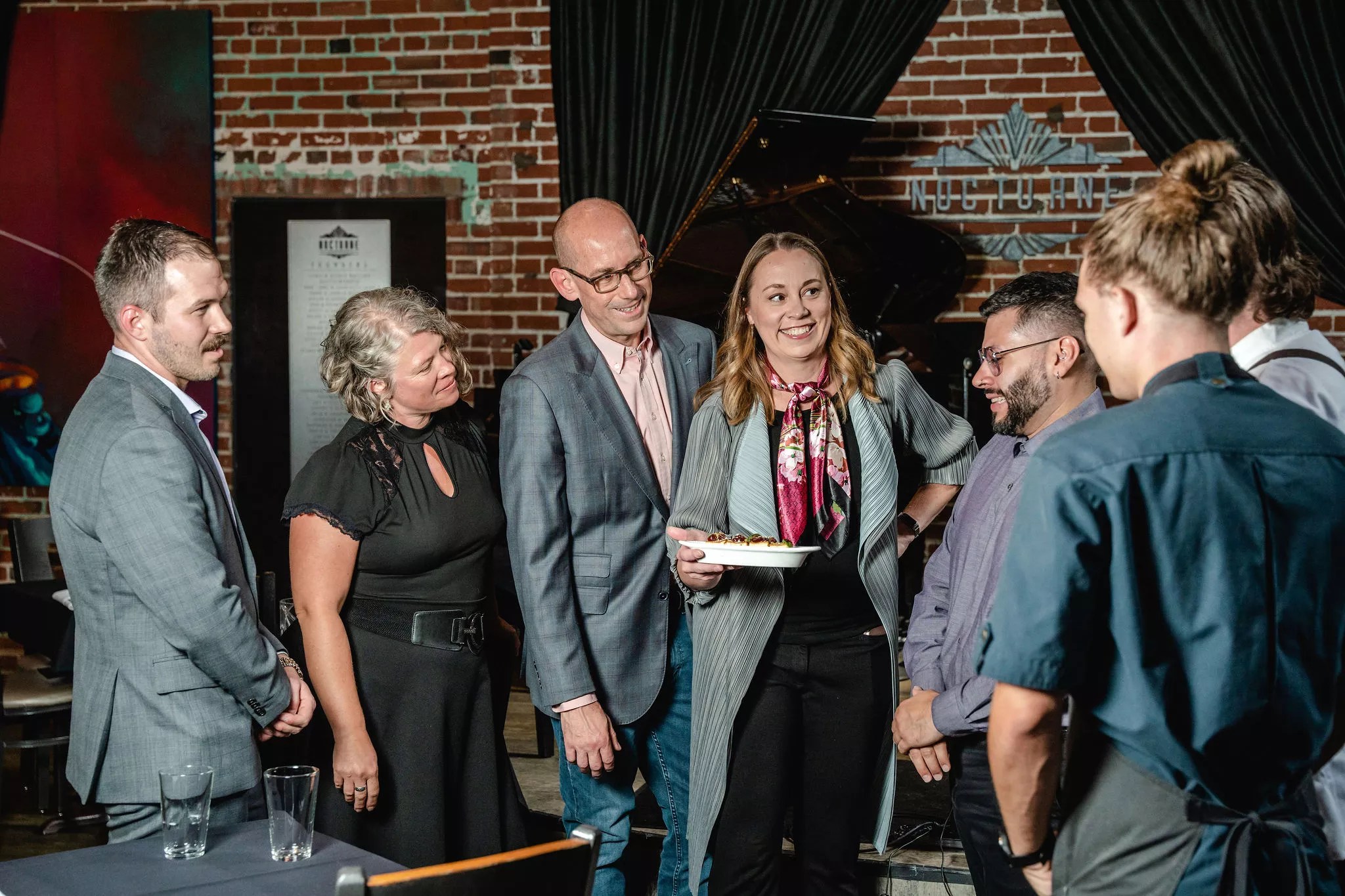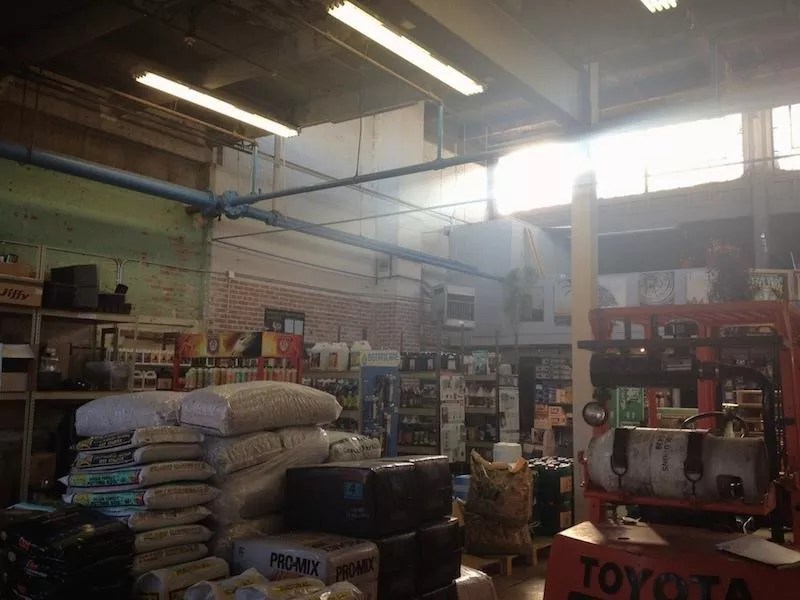
Courtesy of Nocturne

Audio By Carbonatix
In January 2014, on a bitterly cold Denver day, Scott Mattson stood in a warehouse surrounded by fertilizer, grow lights and a dripping ceiling. “It was rough,” he recalls. “But it was also by far the best place we’d seen.”
At that point, Scott had just finished another disappointing tour for a venue in the RiNo neighborhood, which he knew wouldn’t work for the jazz club he wanted to create. He was feeling discouraged when he walked into the dilapidated building at 1330 27th Street. He and his wife, Nicole, had already been shown “fifty or sixty” properties in Denver, he says, but they were still no closer to finding a location.
Then the property manager offered a last-minute suggestion: a building that wasn’t even officially on the market. The place was only a block away, so Scott decided to walk around the corner and check out the venue.
“I walked into the middle of the room, and a weird thing happened,” Scott remembers with a smile. “I’m not very woo-woo, but I just saw the layout of the room. I saw where the stage would fit. I saw the bar, the mezzanine – everything you see now just filled my brain. I took a photo and texted Nicole, ‘I found Nocturne.'”

“There’ll be more ahead that we haven’t learned about yet,” Nicole Mattson says of the club’s next ten years, “but just like in jazz, you get really good at improvising.”
Courtesy of Nocturne
When Scott stepped into the space, he was instantly able to see past the grime, forklift and sketchy staircase. But for Nicole, who could not attend the tour because she was at her day job as the senior director of revenue management at Sage Hospitality Group, it took some time to see the vision for the space.
“I thought he was joking,” she recalls. “When this picture of the warehouse came through, I was like, ‘You’re pulling my leg.’ But then my second thought was, ‘Oh God, what if it’s not a joke?’ And it wasn’t.”
By the time she got home, Scott had mapped out the space in exact detail. “It’s really remarkable to see the vision that was in his head before it was all built compared to what it ended up being, because it’s pretty true to what was originally in his head,” Nicole says. What followed was months of demolition and reconstruction – nearly all of it done by hand.

To prepare the building for business, Scott and Nicole Mattson pressure-washed decades of dirt off the walls, often in the dark because there was no electricity until late February.
Courtesy of Nocturne
“Because we didn’t have any money, we had to do all the renovations ourselves,” Scott explains. Beginning in August 2014, friends and family arrived with chainsaws to help clear out the collapsing mezzanine and the remains of previous tenants, including artists and NoDo Urban Garden Supply. They pressure-washed decades of dirt off the walls, often in the dark, as there was no power until late February.
“You can still see some of ninety years of manufacturing, grime, gunk and dirt if you look up,” Scott says as he points to the venue’s ceiling. “They are the areas where the ceiling is white and gray, but previously, the entire space looked like that. To clean it, I would go up the scaffolding, and we had these like ponchos on while bad gray water was pouring down; we would squeegee it out and then do it again.”

Plans for Nocturne at 1330 27th Street.
Courtesy of Nocturne
Originally, they had planned to open Nocturne in late 2014, but because of “a lot of snafus,” those plans were delayed. They had to deal with contractor errors, such as a team that built the space’s custom curved staircase incorrectly twice and had to replace the electrician halfway through the project due to their failure to show up. But after months of sweat, weekend work sessions and sleepless nights, they finally opened the doors to the public on March 9, 2015.
“Opening was a little nerve-wracking,” Nicole admits. “I was worried no one would show up and remember being really happy when opening was filled with people who were not friends and family. Once we got strangers in here, that’s when I realized this was going to work.”

Nocturne currently employs 28 people, including many with arts backgrounds.
Courtesy of Nocturne
For the couple, the opening represented the realization of a long-held dream of contributing to their city’s cultural fabric. The two high school sweethearts first met at the Orange Julius in Lakewood’s now-closed Villa Italia Mall when Nicole was fifteen and a freshman at Pomona and Scott was seventeen and a senior at Green Mountain; they have been inspiring each other ever since. Their shared love for jazz started early in their relationship, with Scott influencing Nicole’s taste in music by swapping out her CDs for such jazz legends as Nancy Wilson and Cannonball Adderley.
“I was a young, impressionable teenager, so those were on repeat on my CD player for a long time,” Nicole reminisces. “Jazz was one of the first things we bonded over, and although I’m not a jazz drummer like Scott, I’m a huge music supporter.”
From the beginning, Nocturne was never just a jazz club. Scott’s love of jazz and Nicole’s passion for hospitality inspired the creation of a modern take on the 1940s jazz supper club, featuring live music, seasonal cuisine and craft cocktails. Before opening, the couple traveled to New Orleans, New York, Chicago and other cities across the country, learning from the best jazz clubs and fine dining restaurants.

“To get a new audience to enjoy jazz, you have to appeal to a new aesthetic, which in 2015, meant you had to go beyond the Appletini and do like a true craft cocktail,” says Nicole Mattson.
Courtesy of Nocturne
Early on, they experimented with the format. “We realized we had to make a choice: be a casual music venue or deliver an exceptional hospitality experience,” Nicole says. They leaned into the latter, refining their menus and elevating the dining experience with thoughtful wine pairings and elegant details like tablecloths.
“What we did in terms of combining the fine dining with jazz was a relatively blue ocean at the time,” Nicole says. “There were no jazz clubs at the time that were really focused on the hospitality experience. They were all very focused on the music experience, which is great, but in order to get a new audience to enjoy jazz, you have to appeal to a new aesthetic, which, in 2015, meant you had to go beyond the Appletini and do like a true craft cocktail.”
Residencies quickly became a core part of Nocturne’s identity. Musicians weren’t just booked for a night or two; they were given the opportunity to perform weekly over four to six week, allowing them to workshop material and build connections with the audience.
“Residences are the lifeblood of our music,” Scott explains. “We’ve had artists use their residencies to refine their projects before they hit the studio. There have been dozens of albums that have been a product of Nocturne residencies. Musicians aren’t just playing a gig here; they’re making art. I’ve always felt, from being a jazz musician in my past, that one of the things that has dogged jazz artists is taking a casual approach to one-off gigs. It doesn’t show that the music in the best light, whereas when you can dig in and find depth, that’s when the music shines so.”

“There’s an appetite for excellence at Nocturne,” Scott Mattson says. “As we look to the future, we’re not resting on our laurels.”
Courtesy of Nocturne
One of the venue’s most significant pivots came in 2020, when COVID forced Nocturne to close. “When we could reopen at 25 percent, we knew we had to get the musicians back to work,” Nicole says. “Unemployment was great for our servers and cooks, but musicians weren’t getting the same benefits.”
When Nocturne reopened at limited capacity, the owners took a leap, requiring all floor reservations to enjoy a full three-course dinner. “It was the best decision we’ve ever made,” Scott says. “A lot of people assumed we didn’t take the food very seriously, even though we always had extraordinary chefs. Making it so you have to enjoy the three-course meal if you sit on the floor changed everything. People told me they had been coming for five years but had no idea we cooked seasonally. That moment was a little bit of a rebirth. We did what we always wanted to do, but we were afraid to do.”
Guests who once stopped in for a drink discovered the depth of the culinary program. Scott, who is a certified sommelier and previously worked as Mondo Vino’s wine buyer, helped shape Nocturne’s dedicated approach to food and beverage services. The menu changes seasonally and in response to guest feedback, so there is always something new to look forward to from the kitchen.
Another key evolution that came post-COVID was the decision to no longer accept large parties. “That was a really tough financial choice,” Nicole admits. “Now, when we say no to a party of sixteen, we have to hope that we get a bunch of parties of twos and fours that are here to enjoy the music.”

The building at 1330 27th Street looked like this when Scott Mattson realized he had “found Nocturne.”
Courtesy of Nocturne
Ultimately, that decision has paid off, creating a more conducive environment for the music. Nocturne also changed its hours after a COVID-era curfew forced it to cancel late-night performances, which leadership says has relieved a significant burden on their staff. “We didn’t realize how hard late-night shows were on us because you just do it because it’s fun,” Scott says.
“But then, once you start crunching the numbers, we realized that we’ve been barely breaking even or losing money every late night,” Nicole says. “We realized we should focus on being the place people started their night or did their after-dinner drink, but not be the place people ended their night.”
Nocturne currently employs 28 people, including many with arts backgrounds. According to Nicole, they discovered that hiring people who “believe in the why behind the business” is critical to maintaining the jazz club’s creative culture.
“There’s an appetite for excellence at Nocturne,” Scott says. “As we look to the future, we’re not resting on our laurels.”
Now that Nocturne is a “sustainable business,” the Mattsons plan to spend the next ten years focusing on ways to give back to the community. For example, Nocturne has recently collaborated with Youth on Record for Music Matters March, hosted community matinees for children and allowed the Preservation Foundation to use their kitchen on off days to prepare meals for those experiencing homelessness.
“Once you’re no longer worried about who’s coming in the door on a Wednesday, you can really start making a broader impact,” Nicole says. Still, challenges remain. “Costs are soaring,” Scott says. “It’s a giant thing. Costs increased a little bit in our first five years, but there’s been a big acceleration since COVID. You just figure out how to deal with it. Staffing was brutal in 2018 and 2019 and around COVID. That’s better now, but there’s always a new problem to solve.”
As Nicole and Scott reflect on a decade and consider what lies ahead, only one thing is certain: “There’ll be more ahead that we haven’t learned about yet,” Nicole says, “but just like in jazz, you get really good at improvising.”
Learn more about Nocturne and its upcoming shows at nocturnejazz.com.